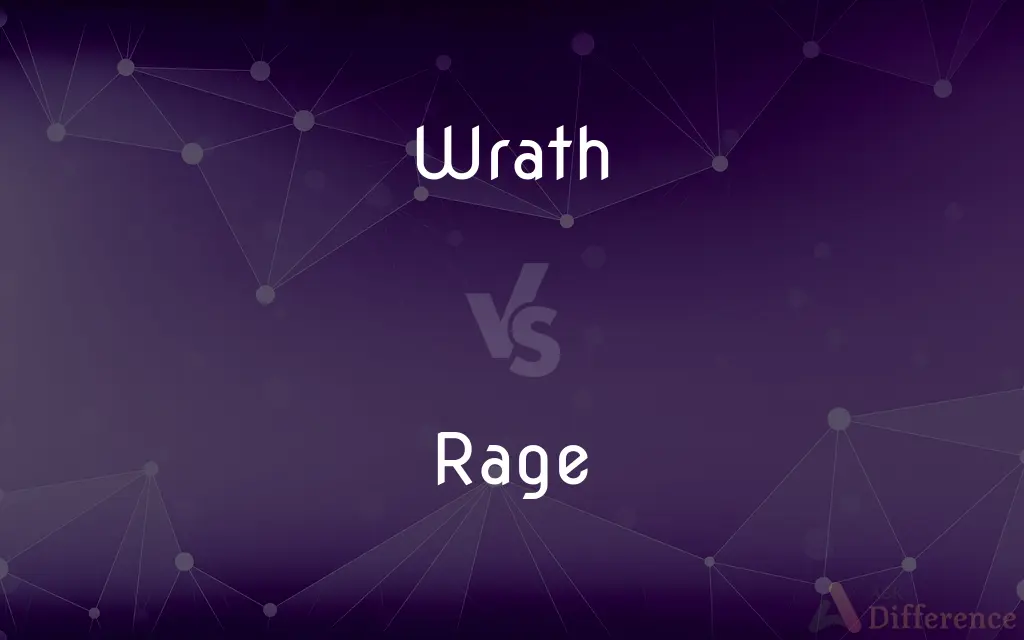Wrath vs. Rage — What's the Difference?
Edited by Tayyaba Rehman — By Fiza Rafique — Updated on April 8, 2024
Wrath often denotes a strong, vengeful anger or divine punishment, while rage implies a wild or violent anger bursting forth uncontrollably.

Difference Between Wrath and Rage
Table of Contents
ADVERTISEMENT
Key Differences
Wrath is typically characterized by its association with justice or retribution, often seen in a moral or divine context. It implies a deeper, more calculated response to wrongdoing. Whereas rage is more about the immediate, overwhelming emotional response, lacking the premeditated aspect of wrath.
Wrath can linger and be directed towards a specific cause or individual, suggesting a purpose or intention behind the anger. It carries a sense of righteousness. On the other hand, rage is usually spontaneous, erupting from the individual without a clear objective or direction, driven purely by emotion.
In literature, wrath is often depicted as a powerful force that can lead to major consequences, both for the individual feeling it and for those subject to it. It's associated with epic tales and divine punishments. Meanwhile, rage is depicted as a more personal, chaotic force, often leading to self-destruction or the immediate lashing out at others.
While wrath may be considered a controlled burn, a sustained feeling that can motivate actions over a long period, rage is like a wildfire—unpredictable, uncontrollable, and capable of causing immediate havoc.
Wrath has connotations of dignity and authority; it's an anger that is justified and has a rightful place in response to injustice. In contrast, rage can be seen as less dignified, a loss of control that can undermine authority or the respectability of the person experiencing it.
ADVERTISEMENT
Comparison Chart
Definition
Intense anger, often with a focus on retribution or justice.
Uncontrolled, explosive anger.
Associated with
Justice, divine punishment, righteousness.
Spontaneity, lack of control, chaos.
Duration
Can be long-lasting and focused.
Typically brief and explosive.
Control
Often controlled or directed.
Lacks control, unpredictable.
Consequences
May lead to planned, significant actions.
Often leads to immediate, chaotic actions.
Compare with Definitions
Wrath
Intense, retributive anger.
The king’s wrath upon the rebels was both feared and expected.
Rage
A brief, intense outburst of anger.
In a sudden rage, she threw the vase against the wall.
Wrath
Controlled, purposeful anger.
She channeled her wrath into fighting for justice.
Rage
Impassioned fervor resembling anger.
He spoke with a rage that startled everyone.
Wrath
Divine punishment or anger.
In many religious texts, divine wrath is a consequence for disobedience.
Rage
Violent, uncontrolled anger.
Overwhelmed by the injustice, he acted in a fit of rage.
Wrath
Righteous anger in response to injustice.
The community felt wrath towards the corrupt officials.
Rage
Emotional turmoil manifesting as anger.
After the verdict, the victim's family was left in rage.
Wrath
A strong, steady desire for vengeance.
His wrath grew from years of mistreatment.
Rage
Violent, explosive anger.
Wrath
Extreme anger
He hid his pipe for fear of incurring his father's wrath
Rage
A fit of anger.
Wrath
Forceful, often vindictive anger.
Rage
Furious intensity, as of a storm or disease.
Wrath
Punishment or vengeance as a manifestation of anger.
Rage
A burning desire; a passion
A rage for innovation in music.
Wrath
Wrathful.
Rage
A current, eagerly adopted fashion; a fad or craze
When torn jeans were all the rage.
Wrath
Great anger.
Homer relates an episode in the Trojan War that reveals the tragic consequences of the wrath of Achilles.
Rage
To speak or act in violent anger
Raged at the mindless bureaucracy.
Wrath
(rare) Punishment.
Rage
To move with great violence or intensity
A storm raged through the mountains.
Wrath
Wrathful; wroth; very angry.
Rage
To spread or prevail forcefully
The plague raged for months.
Wrath
(obsolete) To anger; to enrage.
Rage
Violent uncontrolled anger.
Wrath
Violent anger; vehement exasperation; indignation; rage; fury; ire.
Wrath is a fire, and jealousy a weed.
When the wrath of king Ahasuerus was appeased.
Now smoking and frothingIts tumult and wrath in.
Rage
A current fashion or fad.
Miniskirts were all the rage back then.
Wrath
The effects of anger or indignation; the just punishment of an offense or a crime.
Rage
An exciting and boisterous party.
Wrath
See Wroth.
Rage
(obsolete) Any vehement passion.
Wrath
To anger; to enrage; - also used impersonally.
If him wratheth, be ywar and his way shun.
Rage
(intransitive) To act or speak in heightened anger.
Wrath
Intense anger (usually on an epic scale)
Rage
To move with great violence, as a storm etc.
Wrath
Belligerence aroused by a real or supposed wrong (personified as one of the deadly sins)
Rage
To party hard; to have a good time.
Rage
To enrage.
Rage
Violent excitement; eager passion; extreme vehemence of desire, emotion, or suffering, mastering the will.
He appeased the rage of hunger with some scraps of broken meat.
Convulsed with a rage of grief.
Rage
Especially, anger accompanied with raving; overmastering wrath; violent anger; fury.
Torment, and loud lament, and furious rage.
Rage
A violent or raging wind.
Rage
The subject of eager desire; that which is sought after, or prosecuted, with unreasonable or excessive passion; as, to be all the rage.
Rage
To be furious with anger; to be exasperated to fury; to be violently agitated with passion.
When one so great begins to rage, he is huntedEven to falling.
Rage, rage against the dying of the lightDo not go gentle into that good night.
Rage
To be violent and tumultuous; to be violently driven or agitated; to act or move furiously; as, the raging sea or winds.
Why do the heathen rage?
The madding wheelsOf brazen chariots raged; dire was the noise.
Rage
To ravage; to prevail without restraint, or with destruction or fatal effect; as, the plague raged in Cairo.
Rage
To toy or act wantonly; to sport.
Rage
To enrage.
Rage
A feeling of intense anger;
Hell hath no fury like a woman scorned
His face turned red with rage
Rage
A state of extreme anger;
She fell into a rage and refused to answer
Rage
Something that is desired intensely;
His rage for fame destroyed him
Rage
Violent state of the elements;
The sea hurled itself in thundering rage against the rocks
Rage
An interest followed with exaggerated zeal;
He always follows the latest fads
It was all the rage that season
Rage
Behave violently, as if in state of a great anger
Rage
Be violent; as of fires and storms
Common Curiosities
Can wrath be considered justifiable?
Yes, wrath can be seen as justifiable, especially when it's a response to injustice or wrongdoing.
How do wrath and rage differ in terms of control?
Wrath is often more controlled and directed, while rage is characterized by a lack of control.
Are there physical symptoms associated with wrath and rage?
Both wrath and rage can lead to physical symptoms like increased heart rate, but rage is more likely to cause immediate physical reactions.
How can one manage wrath or rage?
Managing wrath involves channeling anger into constructive action, while managing rage may require techniques to regain control and calmness.
Can both wrath and rage be experienced simultaneously?
It's possible for an individual to feel both wrath and rage, with wrath being a more sustained feeling and rage an immediate reaction.
Are there healthy ways to express wrath or rage?
Healthy expressions of wrath involve seeking justice or change, while healthy expressions of rage may include physical activity or creative outlets to diffuse the immediate intensity.
What is rage?
Rage is an intense, uncontrolled outburst of anger, often violent and without a specific aim.
Is rage always negative?
While rage is often seen negatively due to its uncontrollable nature, it can sometimes lead to necessary action against injustice.
How are wrath and rage depicted in literature?
Wrath is often depicted as a divine or epic force, while rage is shown as a personal, chaotic outburst.
Do wrath and rage affect decision-making differently?
Yes, wrath may lead to calculated decisions driven by a sense of justice, whereas rage can lead to hasty, often regrettable actions.
Can rage be productive?
Rage can sometimes spur action against injustice, but its lack of control often makes it less productive than wrath.
How do wrath and rage impact relationships?
While wrath can be directed and therefore potentially managed within relationships, rage, due to its uncontrollable nature, can cause immediate and lasting damage.
Is wrath always associated with morality?
Wrath is often linked with morality, especially as a justified response to wrongdoing, but it's not exclusively moral.
What role does culture play in the perception of wrath and rage?
Cultural norms and values significantly influence how wrath and rage are perceived and expressed.
Share Your Discovery

Previous Comparison
Axe vs. Pickaxe
Next Comparison
Wage vs. WagesAuthor Spotlight
Written by
Fiza RafiqueFiza Rafique is a skilled content writer at AskDifference.com, where she meticulously refines and enhances written pieces. Drawing from her vast editorial expertise, Fiza ensures clarity, accuracy, and precision in every article. Passionate about language, she continually seeks to elevate the quality of content for readers worldwide.
Edited by
Tayyaba RehmanTayyaba Rehman is a distinguished writer, currently serving as a primary contributor to askdifference.com. As a researcher in semantics and etymology, Tayyaba's passion for the complexity of languages and their distinctions has found a perfect home on the platform. Tayyaba delves into the intricacies of language, distinguishing between commonly confused words and phrases, thereby providing clarity for readers worldwide.
















































